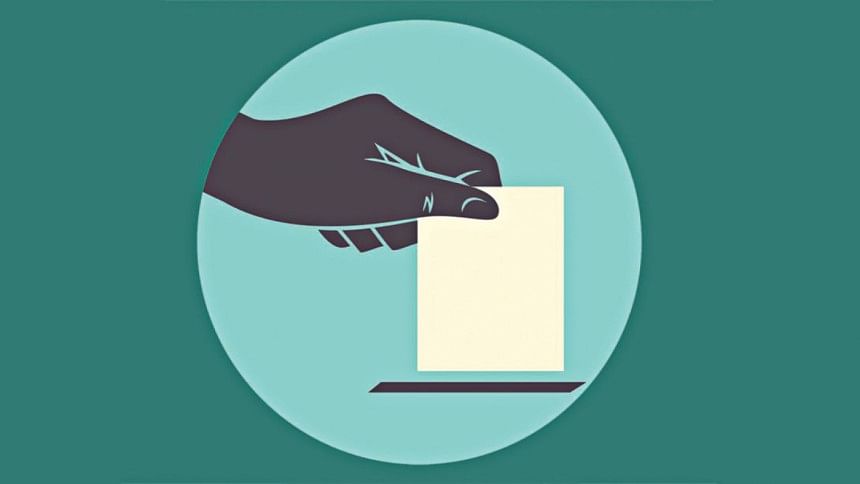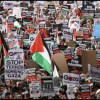To win election, seek only people's endorsement

When we are told by our leaders that democracy is in firm ground, maybe a dispassionate look at the matter is in order. The best that one can describe the prevailing democracy is by labelling it as a command democracy displaying monocratic tendencies. It would be hard also to disagree with anyone who chooses to define the present system as one run by a single party.
Of course there is the so-called coalition of 14-Party Alliance which is composed of such parties, some of whose leaders on their own had never passed in previous elections, and would perhaps not win any election unless they willingly discarded their party identity, be subsumed within the biggest partner and participated under its symbol, as they did in January 2014.
And of course there is the minion opposition whose members, no wonder, are suffering from a crisis of identity according to their own admission. But that is only to be expected if one succumbs to the attraction of ministerial posts and falls in line with the major party.
One has only to look at the TIB report (much reviled by all the ruling parties since it started operating in Bangladesh) on the performance of the members of parliament in the last four years. It is unbelievable that a parliament that is hogged by pro-government parties should suffer from quorum crisis in the parliament. Lack of quorum, we are informed, consumed 152 hours and 17 minutes during the 18 sessions of the 10th Parliament, causing a waste of about Tk 125.20 crore; more interestingly, only 20 minutes were spent on lawmaking, and only 10 percent of the MPs participated in it.
What is the external manifestation of democracy in the country? In a democracy people are the masters and the elected officials are the employees. Every five years, people choose whoever they deem fit to work for them. And it is public money that pays for their time and effort. But alas! The masters were deprived of their right and the opportunity to choose in 2014. And it seems that the role has been reversed and the behaviour of the elected representatives has become increasingly imperious. Legislation, as facts show, is done for party-specific purposes. Spending a meagre 35 minutes on discussing a bill betrays a callous disregard for the interest of the people.
But what occurs today in the country is not entirely the doings of the ruling party alone—thanks to the BNP for abdicating its obligation towards its supporters, a good 40 percent of voters, by boycotting the elections. Power to govern, on behalf of the people, without accountability is a dangerous concoction which the BNP has allowed AL to enjoy. For the AL the last eight years have been "my way or the highway." But not participating in the elections in 2014 was a grave error of BNP. Just think, if Khaleda Zia was the leader of the opposition, would she have faced the situation she finds herself in now?
Also, in a democracy it is the people who are the real owners of this land and its resources, and other endowments that a country claims ownership to, by virtue of its geography and geopolitical location. The elected party and its leader are entrusted to safeguard these endowments. Nothing of it can be bartered away in detriment to national interest. Because, in a functioning democracy, the leader would be asked to explain on behalf of the people, why and how a deal has been made and the basis of displaying magnanimity in return for nothing. But that, as the record shows, is an obligation that is met in its violation. And if there were really a free media, it would have sought accountability of the ruling party for its action.
Regrettably, what we have now is a genuflecting media, with a few honourable exceptions, ever willing to act as the government's publicity mouthpiece. Yes, we have talk show hosts hogged by talk show masters, which governments over the years have flaunted to validate their assertion of media freedom. But the situation is quite akin to a Chomsky description in which he says, "The smart way to keep people passive and obedient is to strictly limit the spectrum of acceptable opinion, but allow very lively debate within that spectrum—even encourage the more critical and dissident views. That gives people the sense that there's free thinking going on, while all the time the presuppositions of the system are being reinforced by the limits put on the range of the debate" (The Common Good, 1998).
However, what is most frustrating is that both parties are seeking the endorsement of our big neighbour. The AL is seeking its support for the next election, as reported in an Indian Bangla daily on May 26, 2018. The prime minister, so the report says, had suggested to our neighbour that India might find two Pakistans on either side of it if it did not return to power.
On the other hand, BNP's visit to India was to persuade it to withhold any backing to the Awami League. That perhaps demonstrates BNP's feeling that there is more than just the Awami League to contend with in national elections. It is true that BNP had relied on anti-Indian sentiments and pandered to the Islamist forces in the past to garner votes. It seems the party has decided to move away from that position. One doesn't have to be pro or anti any country, particularly one's neighbours, to seek a mutually beneficial relationship without impinging on either's national interest.
However, given the expressed attitude of the two parties, we, as Bangladeshis, have all the right to feel indignant about both positions. While India may have its own interest in our elections, India should not be made a factor in our elections. While that is the view of the majority of us, the positions of the two seem as though they would want India to interfere in the matter, a thoroughly abhorrent proposition.
A political party which does not rely on popular support or have respect for popular will has to seek outside endorsement to ride to power or for retaining it. That may succeed but only temporarily. In the continuum of time, 10 or 15 or even 20 years is indeed very fleeting. What will eventuate, however, is the kind of elections we witnessed in 2014. And, not surprisingly, democracy would be described by the ruling party as the best democracy. But the only incongruity would be that the"best democracy" would be one not installed by the people.
Brig Gen Shahedul Anam Khan ndc, psc (Retd) is Associate Editor, The Daily Star.










Comments